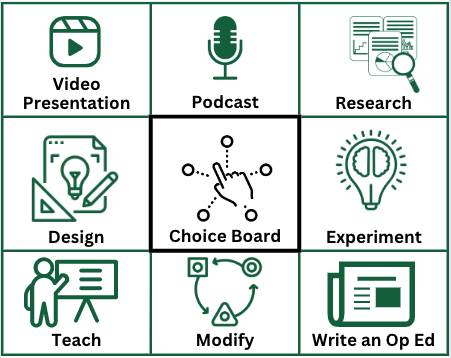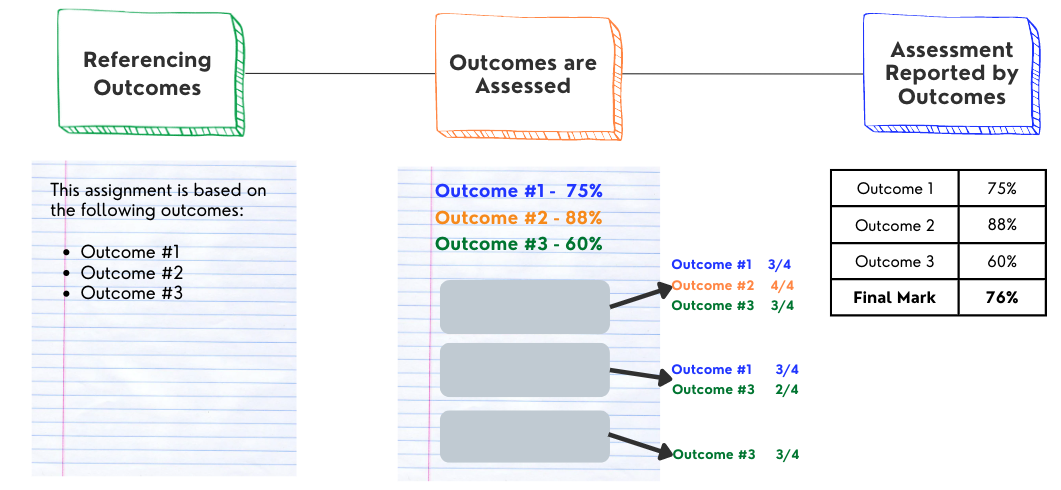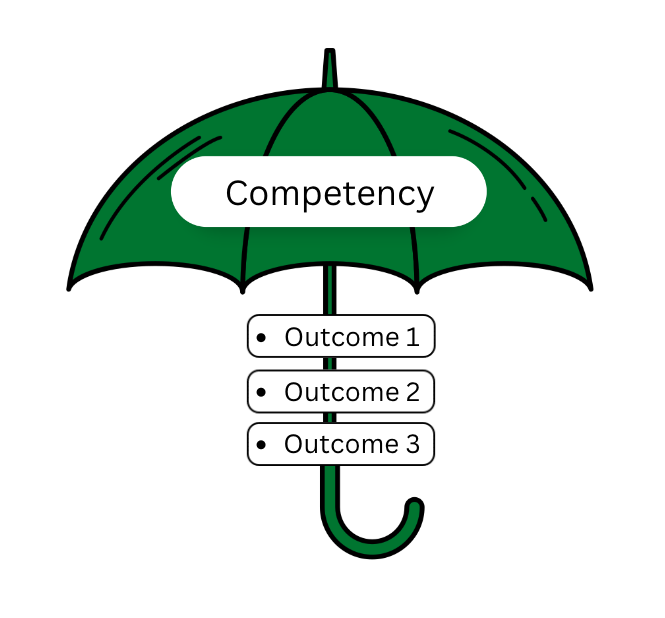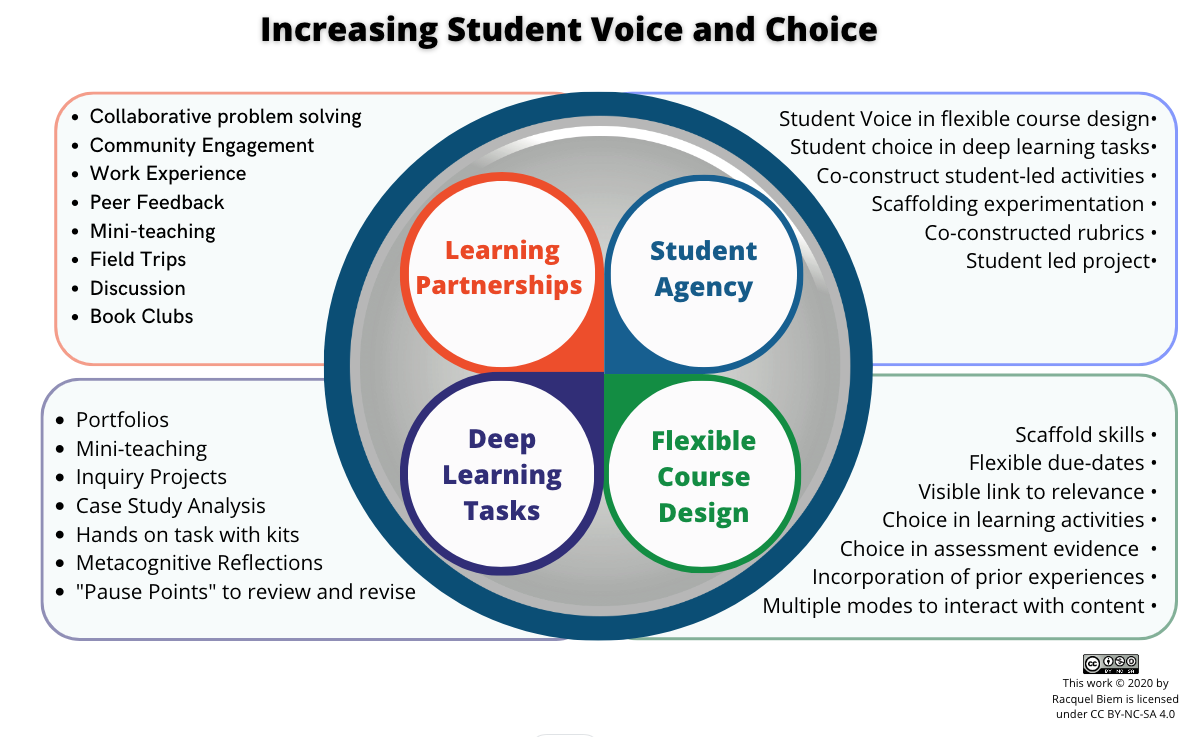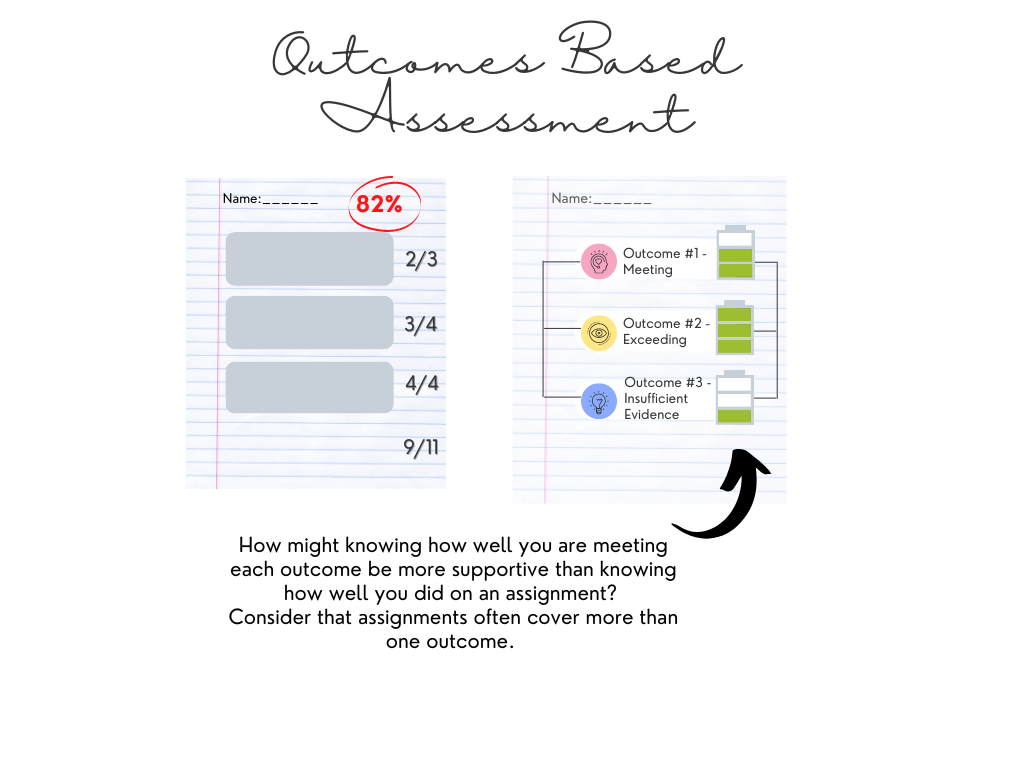-
Comparing two online quizzes: Formative Assessment
This post aims to compare the design of two online quizzes to determine how each design impacts student learning. Formative assessment is a process used to: Identify what students already know and where they need more support to reach the desired learning outcomes. Provide feedback that the student can use to increase learning before a final assessment. For example, using feedback from a draft assignment that can be used to increase understanding for future revisions. Evaluate the effectiveness of the instruction during the learning process so the teacher can adjust instruction to meet students’ needs. “You almost want kids to make mistakes on formative assessments because that’s how you figure out…
-
Student Voice and Choice: Co-Creating Choice Boards
Summary: Co-creating a list of potential assessments with students is a great opportunity to increase student voice and choice. Students who choose assessments that are personally relevant are more likely to be motivated, engaged, and take ownership of their learning. Giving students a choice and voice in assessments allows them to demonstrate their understanding of the material in ways that are meaningful to them. Date of publishing: February 23, 2023 Choice Boards A choice board is a is a grid or chart that provides students with a set of options to meet learning outcomes. Choice boards can be used in many ways, depending on the goals and outcomes in the course.…
-
An Outcomes-Based Practice Continuum
This article will discuss a continuum of outcomes-based practices including referencing outcomes, assessing outcomes, and reporting student achievement on outcomes. Referencing Outcomes Referencing outcomes is a beginning outcomes-based practice. Outcomes are referenced within each assignment, often with the instruction section. Here, the instructor has created the assignment with the outcomes in mind and makes this visible. However, outcomes are not assessed separately, and assignments are given a ‘blanket score’ for multiple learning outcomes. Gradebook reporting is done by assignment. Assessing Outcomes within Assignments The next stage occurs when the outcomes within assignments are assessed. This stage provides valuable insight to determine the most important areas for improvement. Instructors create valid tools,…
-
Defining Competencies and Outcomes
Summary: Improve your course clarity with competencies and outcomes. Learn how to break down complex skills into measurable parts for better student understanding and success. Date of publishing: January 16, 2023 Defining Competencies and Outcomes Although there is no widely accepted distinction between a competency and an outcome, there is sufficient commonality for the following working definition to be used to improve the structure and clarity of courses and programs. A competency is an overarching capability the learner can do. Examples include critical thinking, problem solving, effective communication, design functions, or physical performative skills. Since a competency is generally too complex to measure on its own, it must be broken…
-
Defining Authentic Assessment
Summary: Authentic assessment emphasizes real-world application of skills and knowledge. Learn how it enhances student engagement and aligns with meaningful learning outcomes. Date of publishing: January 13, 2023 The term “authentic assessment” is often misleading as it is not just about assessing a student submission ‘authentically’; rather, it focuses on the context and relevance of learning beyond academia. The following definition considers the interconnectedness of learning tasks, activities, and feedback in designing authentic assessments. Authentic assessments are evaluations of student learning that use real-world tasks or performance-based assessments in authentic contexts. Authentic assessments rely on continuous feedback for improvement in their design. The goal of authentic assessment is to assess…
-
Increasing Voice and Choice in the Classroom
Summary: Boost engagement in your classroom! Discover strategies to amplify student voice and choice, making learning more personalized and empowering for all. Date of publishing: December 21, 2022 When we think of increasing voice and choice in the classroom we may immediately think of choice in assignments or assessment tasks. Whereas these do increase student choice, these alone do not get to the heart of increasing student voice and seeing students as partners in the teaching and learning process. It is for this reason that supporting student voice and choice requires building a learning environment focused on partnerships, student agency, flexible learning paths, and deep learning tasks. The learning framework…
-
Perusall or Discussion Boards
Previous blog posts have introduced Perusall to turn pre-class readings into social learning. In this post, let’s explore how instructors might use Perusall to overcome discussion board fatigue and provide resources on using Perusall along with sample learning activities. Perusall is a free social learning tool that students can access through Canvas. Students have discussions in the same space as they read course material. The image below shows what a student would see in Perusall, with the reading in the middle and the conversation on the side. This post only refers to the use of readings in Perusall. However, videos, images, podcasts, and webpages can all be used. Additionally, responses…
-
Assessing Outcomes versus Grading Assignments
Shift your focus from grading tasks to assessing outcomes. Learn how this approach fosters deeper learning and provides a more meaningful evaluation of student progress. In this article, we will examine why assessing outcomes can target learning improvements better than grading assignments.Ooutcomes-based assessment starts with articulating what students will be able to do (the learning outcomes), followed by designing learning activities and assessments linked to the outcomes. However, even with clear outcomes and learning activities, instructors often fall into the habit of grading assignments rather than assessing outcomes. Consider the following scenario. Learner 1 and Learner 2 both have 75% in your class. How do you, the instructor, or the…

